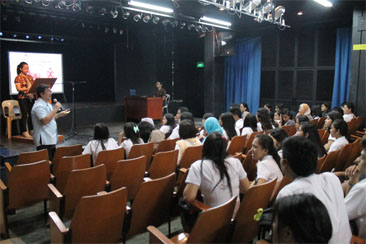
With the increase in HIV cases reported in the country, the University Health Services Office organized on Jan 10 a lecture on the topic, stressing on the need for citizens to be properly informed and tested.
Dr Joselito Retuya, an epidemiologist at the Social Hygiene Clinic of the City Health Office, noted that from 100 reported cases per year from 1984-1994, the figure has spiked to 4,456 reported cases from January to November 2013 alone. That’s about one new HIV case reported every two hours.
Data from the National AIDS Registry also show that 70-80 percent of those affected are between the ages of 15 and 34 years old. More males are also getting infected, Retuya said.
Human immunodeficiency virus (HIV) is an infection that attacks and weakens the immune system. It is transmitted through unprotected, penetrative sex; blood and blood products; and from mother to child through breastmilk. People with HIV should be given anti- retroviral therapy to control HIV replication.
Over time, if left untreated, HIV can lead to acquired immunodeficiency syndrome (AIDS), a complex sickness that makes a person vulnerable to devastating illnesses.
Retuya said that the best means of HIV protection is education. He urged the students to educate themselves and not discriminate people who are living with HIV/AIDS.
Above all, it is very important to be tested, Retuya said. HIV testing and anti-retroviral therapy are given for free at the Social Hygiene Clinic of the City Health Office.